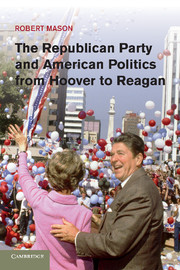Book contents
- Frontmatter
- Contents
- Acknowledgments
- Introduction
- 1 “From Old Home Melodies to Jazz Music”: 1928–1933
- 2 “As Maine Goes, So Goes Vermont”: 1933–1939
- 3 “The Simple Barefoot Wall Street Lawyer”: 1939–1945
- 4 “Liberty versus Socialism”: 1945–1953
- 5 “Modern Republicanism”: 1953–1961
- 6 “A Choice, Not an Echo”: 1960–1968
- 7 “There’s a Realignment Going On”: 1968–1976
- 8 “You Are Witnessing the Great Realignment”: 1977–1989
- Conclusion
- Archival Sources
- Index
- References
Introduction
Published online by Cambridge University Press: 05 December 2011
- Frontmatter
- Contents
- Acknowledgments
- Introduction
- 1 “From Old Home Melodies to Jazz Music”: 1928–1933
- 2 “As Maine Goes, So Goes Vermont”: 1933–1939
- 3 “The Simple Barefoot Wall Street Lawyer”: 1939–1945
- 4 “Liberty versus Socialism”: 1945–1953
- 5 “Modern Republicanism”: 1953–1961
- 6 “A Choice, Not an Echo”: 1960–1968
- 7 “There’s a Realignment Going On”: 1968–1976
- 8 “You Are Witnessing the Great Realignment”: 1977–1989
- Conclusion
- Archival Sources
- Index
- References
Summary
This book investigates a long period of the twentieth century – from the late 1920s to the 1980s – when fewer Americans identified themselves as Republicans than Democrats, when the Republican Party was the minority party in the United States. The Republican Party and American Politics from Hoover to Reagan is about this minority problem. It looks at how leading Republican politicians conceptualized the problem of their party’s minority status, the puzzle of why a majority preferred the Democrats. The answers were by no means clear. There was consequently a debate within the party about its problems, a debate that was often fierce. One of this book’s goals is to track this debate. Based on their conceptualization of the problem, Republicans took actions to solve it. Another goal is to analyze these efforts to revitalize the party. Their results were often disappointing. Until the party’s Reagan era breakthrough – when Republicans nevertheless achieved not majority status but parity with the Democrats – success was short-term at best. The book considers why these plans for party revitalization tended to end in disappointment.
One way to view a political party is as an office-seeking vehicle, working to maximize its candidates’ chances of election and thus of power. Within this context, the Republican record from Hoover to Reagan is remarkably, surprisingly weak. Post–World War II Republican administrations dominate perceptions of national politics in their respective years, but their visibility obscures the degree of Democratic success during this period. A “short twentieth century,” between the arrival of the Great Depression and the end of the Cold War, was a period when there were almost always more Democrats than Republicans in Congress, in state legislatures, and among governors. More Americans consistently felt a sense of connection and affiliation with the Democratic than Republican Party, considering themselves Democrats, not Republicans. Republican victory was the exception to the rule during this lengthy period of modern U.S. history.
- Type
- Chapter
- Information
- Publisher: Cambridge University PressPrint publication year: 2011



